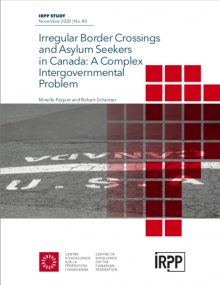Between 2017 and mid-2020, the Royal Canadian Mounted Police intercepted 59,658 people as they crossed into Canada outside official ports of entry. In this study for the Centre of Excellence on the Canadian Federation, authors
The authors consider a potential for the pressure for Canada to accept refugees to increase in the wake of COVID-19, focusing on how the lessons learned from Canada’s response to this episode of irregular border crossings should serve as a foundation for reforms to the intergovernmental system to address this complex intergovernmental problem. They make four key recommendations to ensure that Canada’s intergovernmental relations system is better prepared to manage future flows of irregular border crossings: improving federal funding, clarifying the responsibilities of each level of government, creating a permanent, intergovernmental forum where cities can be partners in the planning and policy development, and exploring new ways to settle asylum seekers across the country.
